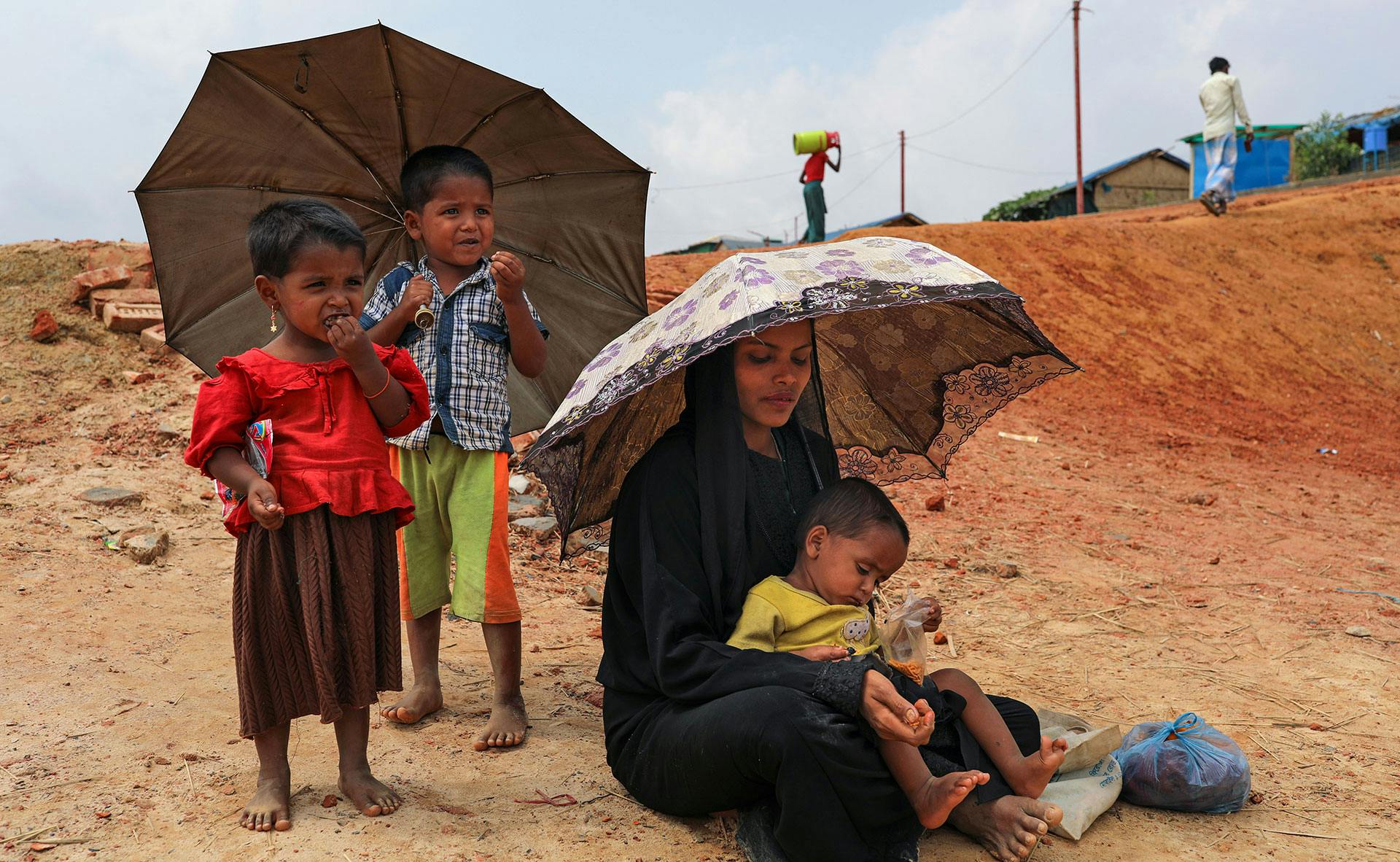As they filed into a grand stateroom in Geneva, the signatories to the 1951 UN convention relating to the status of refugees were not dealing with an abstract problem. A world war had convulsed Europe, and displaced, deported, and resettled people were turning up at borders of safe states across the globe.
The convention set out the definition of refugees—people who were outside their country because of a “well-founded fear of being persecuted for reasons of race, religion, nationality, membership of a particular social group or political opinion”—and their expected treatment. It declared that if a citizen’s home country could not protect and care for him or her, the international community would.
Refugees would be given the right to work, housing, and education. They’d be assisted by public relief, and they would be free to practice their own religion. They could move freely, and be issued with documents to help—and they wouldn’t be expelled. The key definition appears early on in the 46-article document, right there in Article 3: "Refugees shall be treated without discrimination."
The world has changed a lot since 1951, and so has the document, after a protocol was amended to it in 1967. State borders have shifted, and public perceptions hardened. Has the definition of a refugee, written down in black and white nearly 70 years ago, changed in practice, if not in theory? We spoke to three charities around the world dealing with refugees about how their clients are treated.
Greece
Colder times of year are troublesome for refugees. “People often think about Greece as being a hot country, but outside the summer, it is a hostile environment,” says Paul Hutchings, co-founder of Refugee Support Europe, which has been supporting refugees in Greece for three years. When the charity arrived in the country at the height of Europe’s migration crisis, the thousands of people who arrived each day were sleeping in tents. The situation has improved somewhat: new arrivals are housed in Isobox containers.
Since the charity first arrived in Greece in 2016, the influx has slowed down, and an average of 89 people a day arrived on the shores of Greece’s islands by sea last year. In part, that’s due a shift in approach by the Greek government. At the height of Europe’s migrant crisis, when thousands escaped Syria and sub-Saharan Africa, refugees were welcomed. “If they had to make that kind of journey, risking their lives across the sea, they were eligible,” says Hutchings. But now Greece has changed tack. New arrivals from those countries are held on the islands of Lesbos, Chios, and Samos, where their refugee status is adjudicated.
While they’re kept in limbo, life is hard. “These camps tend to be in isolated places, on the edges of towns or cities,” says Hutchings. “They’re former military camps, and derelict. They’re brownfield sites without services.” And they’re in a country struggling with its own austerity crisis.
Life has improved for those left in purgatory, though. Refugees in the camps are no longer given “shit food” (as Hutchings describes it) and instead given cash to buy their own food in local shops. But treatment is very much the minimum required, following the letter, if not the spirit, of the 1951 convention.
“They are treated humanely and given somewhere to live, but some of the basic human needs and semblance of accommodation and food are lacking,” says Hutchings. “They’re not starving and not going to die on the streets, but many of the rights most other Europeans would consider fundamental aren’t being filled.” Children go uneducated—a no-no, and while adults are allowed to work, the remote location of the camps and the lack of money makes it difficult to travel to a job. Some experience prejudice, which happens when mostly Muslim migrants arrive in a strongly Orthodox Christian country.
Still, some Greeks, known for their hospitality, are trying to make amends. On the Katsikas camp in the city of Ioannina, as one of 1,000 refugees from 30 different countries, is a single mother called Amal. She holds a Kuwaiti passport but fled from Syria with her three children. “It’s quite difficult for her by herself, but she speaks pretty good English, and her Arabic is excellent,” says Hutchings.
In Ioannina, she’s struck up a relationship with a local woman. Amal teaches her Arabic; she teaches Amal Greek. They use English as the intermediary language, just as the 145 parties to the UN refugee convention did all those years ago.
United Kingdom
Selina Hales works for Refuweegee—a charity based in Glasgow, Scotland, that's named after the common name for people who live in the city: “weegees,” short for Glaswegian. “One of the reasons we have the name we do is to fight against any bias or confusion people have about what the word 'refugee' means,” she explains. But the bias comes from the highest echelons of government, even though it’s not meant to.
“Anyone that arrives here through the vulnerable person resettlement (VPR) program [an official government policy set up for refugees from Syria, the Middle East, and Africa] gets everything they need,” she says. Glasgow has Iraqi, Syrian, and Afghan VPRs. “But anyone who comes here through the asylum process won’t.”
In part that’s because of great British bureaucracy. Refuweegee sees everyone coming to the country fleeing problems as refugees, but others say refugees must be given legal refugee status by the UK Home Office to remain in the country before they'll help. “That loophole is used by so many organizations as a get-out,” Hales says.
Housing is a major issue refugees face when they arrive in the UK. They’re given little information and options presented as a fait accompli: take housing that’s often unsafe, or take nothing. A recent charity service user’s wife was walked in on by someone claiming to be a gas safety engineer while in the shower, Hales claims.
The available education is no better. Although most people do eventually get onto a further education program or into English as a foreign language classes, it can take anywhere from six months to a year. “The amount of time it takes means people are isolated and vulnerable and at risk of serious mental health problems,” says Hales. “If people don’t have fight, and the energy and nature to push, they just get left behind.”
The cornucopia of service providers doesn’t help matters either. Hales has struggled to help a refugee with post-traumatic stress disorder get mental health treatment. After being sectioned (or involuntarily hospitalized), he was left without aftercare or any proper follow up. “He continues to self-harm; he continues to have suicidal thoughts,” she says. “He continues to cry for help through channels that don’t have the necessary training and support. If it feels for us as a service provider that we’re being passed from pillar to post, he has absolutely no hope."
Australia
“I feel like refugees are seen in a very binary light: either bad or good,” says Shukufa Tahiri of Refugee Council, an Australian charity. People who arrive in Australia through the humanitarian system are seen as “good refugees,” waiting in line for their turn to be welcomed. Those who flee conflict and extreme poverty on migrant boats are seen as bad. They’re “queue jumpers, illegals, who come into the country to violate and break the social and economic systems.”
The public perception hasn’t come from nowhere, and Australia’s highest-ranking politicians are to blame for that, says Tahiri. “Since 2001 they’ve played with political fears, using refugees and people seeking asylum as a scapegoat to run their political gains. It’s something they can invest in politically to gain support for winning elections.”
And that affects the life they can lead when they arrive—if they even arrive. The government claims it has stopped refugees arriving by boat on Australia since 2014, though most experts agree that is not true. Those who do arrive are often sent to two islands nearby, where they’re kept in inadequate conditions, deprived of food, and denied medical treatment, according to a class action lawsuit filed against the government in December 2018. It’s a far cry from the 1951 declaration, and more than 1,000 refugees remain on the two islands, Manus and Nauru.
Those that make it to the mainland are placed into a precarious situation, given a bridging visa which can then transfer to a three- or five-year visa. “After that time they’re supposed to be reprocessed and reassessed, so they need to prove again they’re refugees and their lives are in danger,” says Tahiri. That’s almost impossible to substantiate when you haven't set foot in your homeland for five or seven years. “The system is set up in a way to fail them.” People become homeless, fall ill; “uncertainty affects them,” she says. “There’s no certainty to build their future here. They might get sent back.”
Yet some people persist. Tahiri has helped an Afghan from the Hazara ethnic group settle in Australia. He arrived in his mid-teens, and has an uncommon intellect, scoring 96 out of 100 in a standardized test at the end of his schooling. “That’s remarkable, not least for someone who has been in the country for only three years.”
Friends were worried he’d squander that intelligence laying bricks, which he’d been doing to support himself during school, without help. Tahiri took him to a university, where the two of them advocated for him to be granted a scholarship worth US$185,400 (A$260,000). The vice-chancellor was worried it would set a precedent and open the floodgates, but eventually agreed. The refugee-turned-bricklayer now has a third act in his life: He’s now a business and engineering student at one of the country’s most prestigious universities.











